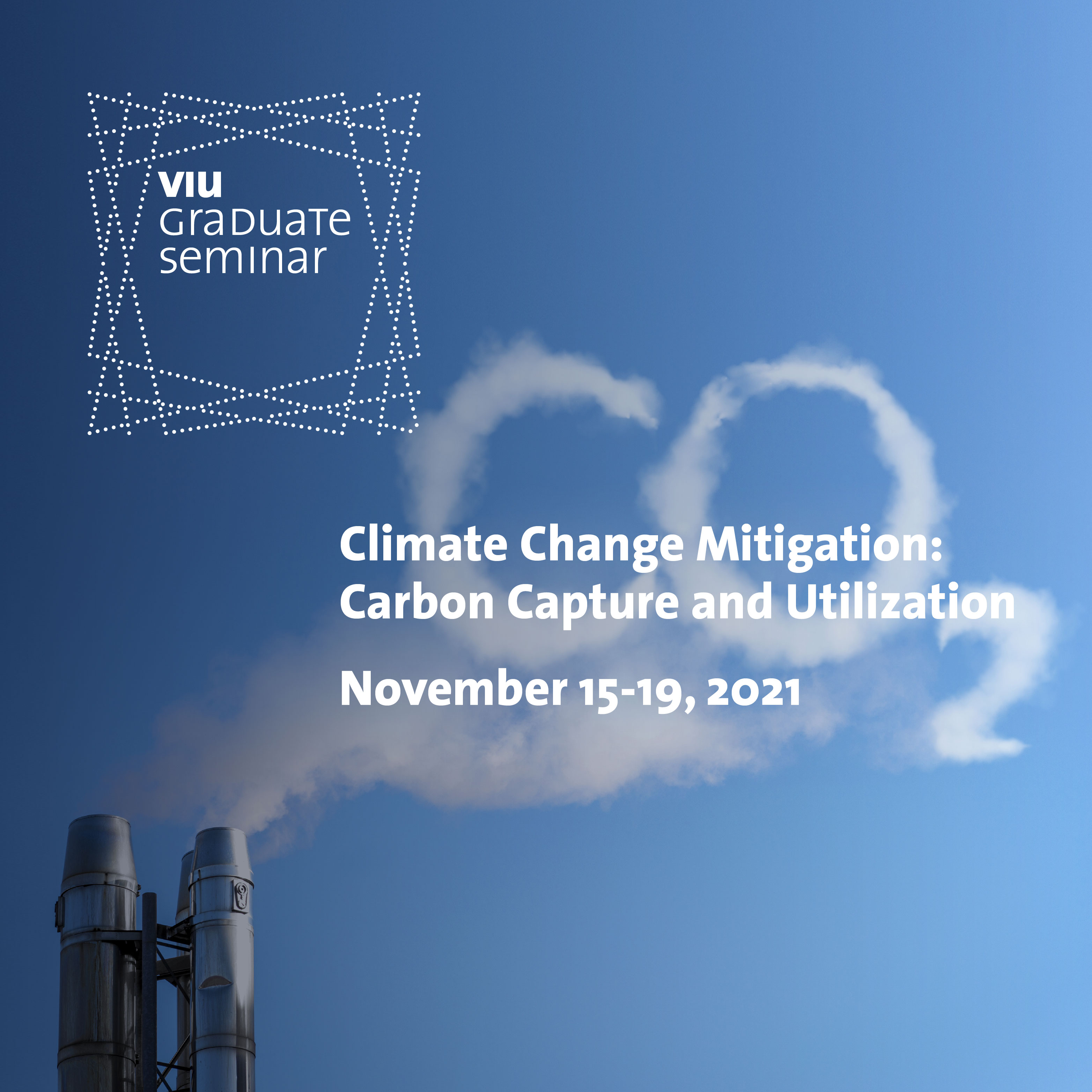November 15-19, 2021
This Graduate Seminar will be led by:
- Tor Vergata University of Rome, Italy
- Institut National de la Recherche Scientifique, Canada
- Tsinghua University, China
- KU Leuven, Belgium
The aim of this graduate seminar is to provide the students with a comprehensive overview of carbon capture and utilization strategies with regard to their current stage of development and implementation, focusing on scientific and technological aspects, but also environmental, social and economic sustainability issues.
The program will examine technologies for separating CO2 from different types of sources such as flue gas, biogas and air, and for producing products such as chemicals, fuels (also bio-derived) and construction materials.
Although geological storage will not be specifically addressed during the seminar, permanent storage of CO2 by natural and accelerated weathering will be examined together with other utilization processes. As CO2 may be used in many different applications, the seminar will have a multidisciplinary approach involving professors and students from different disciplines: chemistry and biology, civil and environmental engineering, and earth science. The aim is to encourage and stimulate discussions from students from different backgrounds to allow them to individually and collectively identify synergies and possible new approaches and strategies in the developing field of CCUS.
Faculty
Renato Baciocchi, Dept. Civil Engineering and Computer Science Engineering, Tor Vergata University of Rome (Coordinator)
Giulia Costa, Dept. Civil Engineering and Computer Science Engineering, Tor Vergata University of Rome (Coordinator)
Louis-César Pasquier, Centre Eau Terre Environnement, Institut National de la Recherche Scientifique
Ming Zhao, School of Environment, Tsinghua University
Thomas van Gerven, Dept. Chemical Engineering, KU Leuven
Stefano Stendardo, Italian National Agency for New Technologies, Energy and Sustainable Economic Development (ENEA)
Angela Di Benedetto, CIRCC-University of Bari, Italy
Michele Aresta, CIRCC-University of Bari, Italy
Topics
- Role of CCUS within climate change mitigation strategies
- CO2 capture processes
- Solid sorbents for CO2 capture
- Strategies for achieving negative emissions: air capture and BECCS
- CO2 utilization and storage
- CO2 to fuels
- CO2 to chemicals
- Biotechnologies and catalysis for CO2 conversion
- CO2 to materials: carbon mineralization
- Carbon mineralization applications in the construction sector, for industrial residues and mining residues
- Process intensification and its application for CO2 capture and utilization
Methodology
The one-week seminar is conceived as a series of lectures by participating faculty and invited speakers, followed by discussion and question time, during which the students will identify specific topics to address during the student activity session. During this latter activity, which will take place on the afternoon of the fourth day, the students will break up in groups and discuss specific topics that they have identified as critical for the development and deployment of carbon capture and utilization technologies. These discussions will be led by students and involve faculty and will be aimed at collectively identifying a potential roadmap/pathway for the deployment of carbon capture and utilization technologies.
Learning outcomes for participants
At the end of the course students will be familiar with capture technologies to separate CO2 from different sources including power generation, industrial (cement, iron and steel, biomass, petrochemicals, fertilizers etc.) and the atmosphere (direct air capture), as well as the main processes for converting CO2 into valuable products such as hydrocarbons and polymers, but also calcium and magnesium carbonate-based materials. The students will also understand the positive impacts deriving from the application of the proposed technologies but also the critical issues that must be addressed before their large-scale adoption.
Who can apply?
This Graduate Seminar is offered to both Master’s students and young researchers early in their PhD in the following fields: engineering – in particular chemical, civil, environmental, mechanical, materials; chemistry; biology; environmental science; earth science.
This Graduate Seminar is a postponed 2020 activity. Applications are currently closed, however, should any places become available, a new call for applications will be opened.
Sign up for VIU communications to receive updates by email.
https://www.univiu.org/viu-life/whats-new
For further information:
summerschools@univiu.org
As the COVID-19 pandemic is ongoing, VIU will continue to monitor the situation. Should the COVID-19 situation prevent international travel or the confirmation of the program on campus as scheduled, the activity will be moved online. Applicants and confirmed participants will be informed of any changes.





























